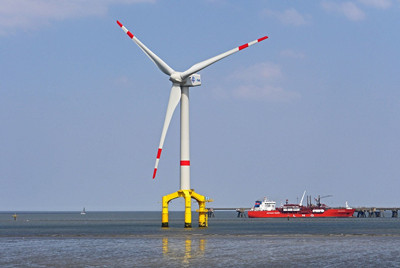
The US continues to talk with Saudi Arabia about the kingdom's plans to
produce nuclear energy for power generation and is still discussing the
possibility of Gulf countries importing US LNG, the outgoing US
secretary of energy said on Saturday.
Next week, Rick Perry will meet in Riyadh with Abdulaziz bin Salman,
the energy minister for Saudi Arabia which had previously stated its
ambitions to enrich its own uranium deposits to produce nuclear power.
"I think there is a bigger issue," Perry told reporters at a press
briefing in Dubai. "You've got to have the right amount and you've got
to have the right quality of uranium before you can be enriching it.
There is a fairly substantial school of thought that the uranium supply
in the kingdom is not in that quality or that quantity either."
Perry added that any nuclear agreement and protocols with Saudi Arabia would need approval of the US Congress.
Investors and government officials are meeting in Riyadh next week
for the Future Investment Initiative sponsored by Saudi Arabia's Public
Investment Fund, a conference that has been called Davos in the Desert.
The US is also holding talks with countries in the region, including the UAE and Saudi Arabia, to import US LNG, Perry said.
"Obviously with the peculiarities of the region and where the gas
comes from and although this is an incredibly gas rich region there are
some restrictions and challenges on how that gas moves around," Perry
said.
US LNG production has continued to increase, having climbed above
the 2.6 Bcm/d mark recently after having averaged 2.28 Bcm/d in 2018 and
2.06 Bcm/d in 2017, S&P Global data show.
President Trump has nominated Deputy Energy Secretary Dan
Brouillette to replace Perry who will leave the post before the end of
the year.
Like Perry, Brouillette has been a big proponent of US energy
exports, often pointing to how booming oil and gas production has
changed the global energy markets and geopolitics.
Not a weapon
Perry said the US, which is the world's largest oil producer, will
continue to not use oil as a weapon. He declined to comment on OPEC
policies.
As a major supplier, the US will "do everything we can to make sure
there is a ready supply of oil and gas around the globe," he said. "We
are very pleased to be in a position that we are in, the number one oil
and gas producer in the world and we don?t intend to use it as weapon.
We intend to make it available in as many places as competitively priced
as we can."
In the past, Trump has criticized OPEC/non-OPEC production cuts and urged them to increase output to reduce oil prices.
The OPEC coalition is currently trimming 1.2 million b/d of oil from
the market, a deal that is set to expire by the end of the first
quarter of 2020. OPEC/non-OPEC ministers meet in December in Vienna to
decide on the next course of action.
Oil security
Perry said he remains concerned about the recent spate of attacks on
oil assets in the Middle East from tankers in the Strait of Hormuz to
the biggest disruption of oil supply in Saudi Arabia on September 14,
when drones and missiles attacked two key oil facilities knocking down
about half of the kingdom?s crude supply.
He said that the department of energy has offered help, including
technological assistance to the Saudi energy ministry after the attacks
on Abqaiq and Khurais, which temporarily cut 5.7 million b/d of
production.
The attacks on Abqaiq, the world's biggest oil processing facility
and Khurais, the country's second largest oil field, were blamed on
Iran, which has denied any involvement.
Perry said the jump in oil prices after the September 14 incident
could have been steeper if it weren't for the abundance of oil supply
from the US and other oil producers.
"If the Iranian attack on the Saudi facility had occurred 5 years
ago the price of crude oil and gas would have shot up substantially and
stayed there for some amount of time," Perry said.

